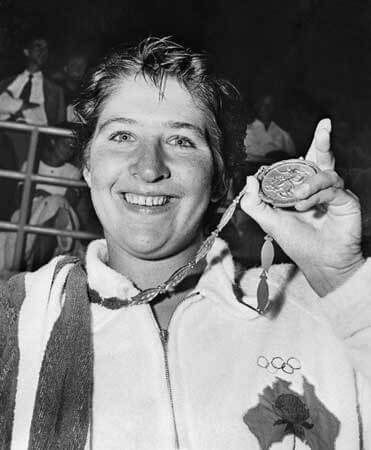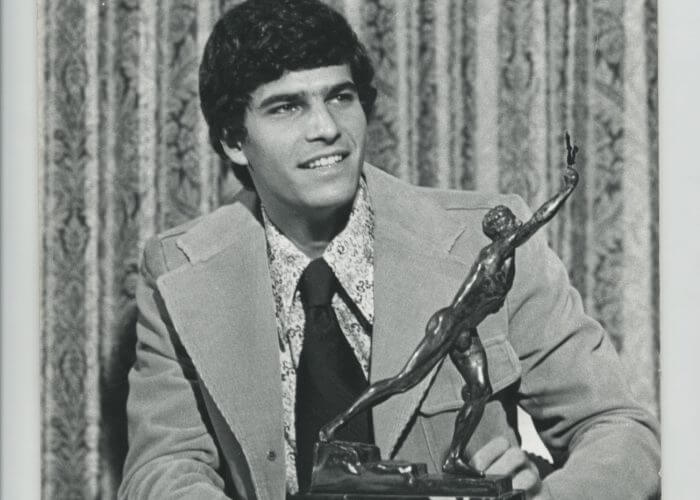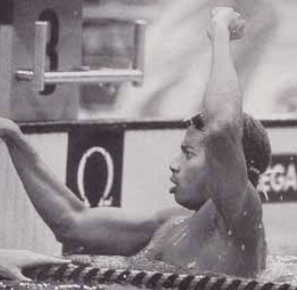A Look At the Most Iconic Pool Moments From the Olympic Games: From Dawn Fraser to Michael Phelps

Editorial content for the 2021 Tokyo Olympic Games coverage is sponsored by GMX7.
See full event coverage. Follow GMX7 on Instagram at @GMX7training #gmx7

A Look At the Most Iconic Pool Moments From the Olympic Games
In the summer of 2019, one year prior to the original date of the Olympic Games in Tokyo, Swimming World designed a series that would pay homage to the history of the sport on its biggest stage. Dubbed Takeoff to Tokyo, the series would feature some of the most-intriguing storylines from the more than 100 years of the Games.
Sometimes, plans do not go according to plan, and when the COVID-19 pandemic struck and forced a one-year delay of the Olympics, Takeoff to Tokyo saw its life expectancy extended. The series ultimately grew into a two-year endeavor, one that featured pieces on legendary figures, epic races, and dark moments. Now, with the Olympics set to take place, it is time to say farewell to this project.
For the final installment of Takeoff to Tokyo, we offer a look (in chronological order) at some of the most-prominent moments in Olympic lore. While some of these entries have been explored in deeper profiles during the series, several are new additions to the TTT vault.
We hope you enjoy this final chapter, and what has come before.
THE INAUGURAL CHAMP
In 1896, when the Modern Games debuted in Athens, Hungarian Alfred Hajos earned a distinction that will never be removed: First swimming champion. Jumpstarting what has been a rich history for Hungary in Olympic waters, Hajos captured gold in the 100 freestyle, a title that was later complemented by another gold medal in the 1200 freestyle.
In the more than a century that has elapsed since Hajos raced to victory in the Mediterranean Sea, Hungary has produced legends such as Tamas Darnyi, Krisztina Egerszegi and Katinka Hosszu. But Hajos will always be his nation’s first Olympic champ and viewed as the athlete who set the stage for future success.
THE FIRST LADY
Sixteen years after the Olympic Games were first held in their modern form, women competed in the sport of swimming at the 1912 Games in Stockholm. There, Australian Fanny Durack etched her name in the history books when she won the 100 freestyle and opened the door for fellow female athletes to show their skills.
This summer in Tokyo, 109 years after Durack broke a gender barrier, the swimming schedule at the Olympics will be identical for men and women.
THE BREAK OF DAWN

100m gold, 1960 for Dawn Fraser – Photo Courtesy: The Dawn Fraser Collection
At the 1964 Olympics, Australia’s Dawn Fraser was already a legend, having won the 100 freestyle at back-to-back Games in 1956 and 1960. The sprint star, however, elevated her status even furth in Tokyo, as she secured a third consecutive gold medal in the 100 free, this achievement despite Fraser nursing a neck injury from a car accident several months earlier that also claimed the life of her mother.
Fraser remained the only member of the three-peat club until 1996, when Hungarian Krisztina Egerszegi won her third straight Olympic crown in the 200 backstroke. Michael Phelps finally gave the male gender inclusion at the 2012 Olympics, when he three-peated in both the 100 butterfly and 200 individual medley. Four years later, at the 2016 Games in Rio de Janeiro, Phelps made it four in a row in the 200 medley.
“I put myself under a lot of pressure by deciding to go to Tokyo and I also put myself under a lot of pressure to compete in the same event in three Olympics,” Fraser said. “I had, at the back of my mind, that this was for my mother because we were saving up for my mother to go to Tokyo with me. I just imagined that she was there and that I was doing it for her.”
FREESTYLE QUEEN
So much is made of what Katie Ledecky has accomplished, and rightfully so. A case can be made for Ledecky as the finest female swimmer in history, and her gold-medal trifecta at the 2016 Olympics might be the best evidence for that claim. But before Ledecky came along, American teenager Debbie Meyer provided targets for all to chase.
At the 1968 Olympics in Mexico City, Meyer won the 200 freestyle, 400 freestyle and 800 freestyle. It is tough enough to pull off three wins in a single Olympiad, but Meyer also had to overcome asthma while racing at high altitude. More than a half-century later, Meyer’s trifecta is still revered, and can be considered a motivational force as Ledecky replicated the feat at the 2016 Games.
SEVEN FOR SPITZ

Photo Courtesy: ISHOF Archives
To this day, what Mark Spitz pulled off at the 1972 Olympics in Munich remains one of the greatest accomplishments in the sport. With victories in the 100 freestyle, 200 freestyle, 100 butterfly, 200 butterfly and three relays, Spitz set a single Games record for gold medals with seven. It was a mark that endured for 36 years, until Michael Phelps did his thing.
Enhancing Spitz’s week was the fact that all seven of his wins arrived in world-record time and in dominant fashion. The closest finish Spitz had was a .43 triumph over countryman Jerry Heidenreich in the 100 freestyle. By winning seven gold medals, Spitz established a bar for all to chase, including the likes of Matt Biondi and Phelps.
“I set a record that lasted 36 years until Michael Phelps broke it,” Spitz said. “It’s amazing that I was an inspiration to someone not even born yet to achieve and excel in my sport. That’s the greatest accolade I could leave for my sport and the Olympic movement. What is a higher regard?”
AN IMPOSSIBLE GOLD
By the time the women’s 400 freestyle relay rolled around at the 1976 Olympics in Montreal, East Germany had won 11 of the 12 events contested. Led by Kornelia Ender, the East Germans seemed unbeatable in the last relay, especially since Ender and Petra Priemer won gold and silver in the 100 freestyle.
More, the United States was facing an opponent which was benefiting from the use of performance-enhancing drugs. Although the suspicion was just that at the time, the cheating ways of the East Germans were confirmed years later.
But the last gold in Montreal did not find its way back to Europe. Rather, the United States pulled off one of the biggest upsets ever, as the foursome of Kim Peyton, Wendy Boglioli, Jill Sterkel and Shirley Babashoff set a world record of 3:44.82 and guaranteed the American women would not go home without a gold medal.
“We got together before the relay and sat there and did this mental thing where you swim the race over and over, see where you are and the time you want to do,” Babashoff said. “We did the swim over and over in our head. This is how we’re going to win. We’re going to train our brains to make us win.”
WHAT COULD HAVE BEEN?
Part of the beauty of sports is taking a cross-generational look at various stars. How would Babe Ruth have fared against Roger Clemens? What would Wilt Chamberlain have done in today’s NBA? In the sport of swimming, politics got in the way of what might have been one of the greatest rivalries.
At the 1976 Olympics, American Brian Goodell was sensational en route to gold medals and world records in the 400 freestyle and 1500 freestyle. Four years later, the Soviet Union’s Vladimir Salnikov pulled off the same double, and delivered a world record in the longer event. The men were expected to clash at the 1980 Games in Moscow, but Goodell’s participation was squashed when the United States boycotted the Olympics in response to the Soviet Union’s invasion of Afghanistan.
With Goodell in his early 20s in 1980, and Salnikov obviously in peak form, the distance events could have produced some of the finest races of all-time. Instead, we are only left to wonder about what might have been.
A BARRIER BREAKER

Photo Courtesy:
These days, Anthony Nesty is known as the highly successful coach of the University of Florida. Yet, before he began to flourish in that role, Nesty became the first black man to win a gold medal in swimming at the Olympic Games. The feat by the Suriname native was achieved at the 1988 Games in Seoul and required an awe-inspiring finish.
Trailing United States star Matt Biondi for the majority of the two laps, Nesty perfectly calculated his finish while Biondi was caught between strokes. The outcome of that scenario was Nesty touching the wall in 53.00, just .01 faster than his American foe. By the slimmest of margins, Nesty delivered a breakthrough for his race and became a national hero.
“I don’t think of it much, but I know my place in history,” Nesty once said. “My philosophy is that I had a great career as an athlete, but my goal now is to be the best coach I can be for the athletes (at the University of Florida). That said, it’s obviously a great honor, especially when I go to Suriname. They’re still celebrating after 25 years and it’s such a sense of pride for a small country like Suriname, and everyone who had a hand in my success should feel a sense of pride.”
SIX IN A ROW – TWICE
While the United States has long been the world’s superpower in the sport, the backstroke streaks the United States carries into this summer’s Olympics is difficult to fathom. In both the 100 backstroke and 200 backstroke, Team USA has won the last six Olympic titles.
In the 100 back, the streak started in 1996 when Jeff Rouse prevailed in Atlanta. He has been followed as Olympic champ by Lenny Krayzelburg (2000), Aaron Peirsol (2004/2008), Matt Grevers (2012) and Ryan Murphy (2016). As for the 200 backstroke, Brad Bridgewater started the run in 1996 and has been followed by Krayzelburg (2000), Peirsol (2004), Ryan Lochte (2008), Tyler Clary (2012) and Murphy (2016).
WILL HE MAKE IT?
At the 2000 Olympics in Sydney, the prelims of the men’s 100 freestyle were not about qualifying order, but the question of whether Equatorial Guinea’s Eric Moussambani would finish his race. Competing alone, Moussambani posted a time of 1:52.72 (slower than the winning 200 freestyle time) while looking like he was going to drown at the Sydney Aquatic Centre.
From a country without a long-course pool, Moussambani was clearly out of his element, but received an invitation to the Games as part of an initiative to grow the sport in smaller nations. Given the nickname, Eric the Eel, Moussambani might have been overmatched, but his determination to reach the wall is now regarded as a show of perseverance.
“The time wasn’t good, but I did it,” Moussambani said. “The experience of the Olympics is not just about competition. It’s also about participation and the spirit (of doing your best). I think that’s what made me famous. When I got out of the pool, people came up to me and gave me congratulations. When I was walking around the Olympic Village, people were asking for my autograph. It changed everything in my life. People knew my name and my country. It let me try to grow the sport in my country.”
A RECORD GOING NOWHERE
The truth is, we could have included Michael Phelps throughout this Takeoff to Tokyo finale. But it seemed most appropriate to conclude the piece with what Phelps managed as a five-time Olympian. From his debut as a 15-year-old in Sydney in 2000 to his farewell in Rio in 2016, Phelps occupied the Olympic spotlight in a way that will never be matched.
For his career, Phelps collected 28 Olympic medals, with 23 of those medals of the gold variety. He twice won eight medals in a single Olympiad, including eight gold at the 2008 Games in Beijing, where he broke Mark Spitz’s record and tied him with seven world records.
The Tokyo Games will mark the first time since 1996 that Phelps is not a member of a Team USA Olympic team, and it will feel strange to not see him on the starting blocks. But Phelps will forever be part of history, his stature as the Greatest of All-Time (GOAT) firmly established.
“This all started and began with one little dream as a kid,” Phelps said. “I wanted to try to change the sport of swimming and do something no one else has ever done – and it turned out pretty cool.”




